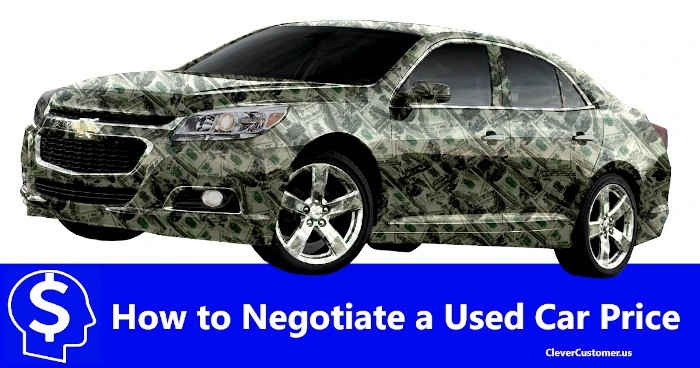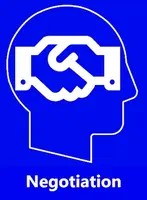Negotiating with a dealer is more complex than with a private party. You need to be sharp throughout the entire process. They often drag it out for hours in an effort to get you concede to some element of the deal. Be prepared to spend a lot of time there. These people do this all day every day. They know what works and what doesn't. They're professional negotiators, and every deal they make is a winner for them in at least one respect. If it isn't, they don't offer the deal.
Negotiate Each Element of the Deal Separately
These are the elements of the deal you will be negotiating. The dealer of course wants to make money on each one:
- The purchase price of the vehicle
- The price they pay for your trade-in, if you have one
- The financing terms, or profitability of the loan
- Add-ons – Extended warranties, window tint, undercoating, and so on
- Miscellaneous fees
The first thing they will ask about is what you want your monthly payment to be. That is the worst place for you to start. What the dealer wants to do is to package everything together in a black box that you can't see into, and just show you the monthly payment. They want to obscure the details of the price of the vehicle, what they'll pay for your trade-in, the interest rate of the loan, the term of the loan, miscellaneous fees, and add-ons.
Insist that you first address the “out-the-door” price of the vehicle. This means the selling price, taxes, documentation fees, less incentives and rebates, everything it would take for you to pay in cash and walk out the door with the vehicle. This is the value you researched. This is the number you know best. Negotiate that number first. Do not focus on the monthly payment, at least not until the time comes to negotiate financing.
Negotiate the Price of the Car You're Buying First
This is where you stand to make the biggest gains. And because nothing else in the deal has been negotiated, the dealer may be more flexible on the price with the intention of making up for it in another element of the deal.
Try to get them to give a number first. Ask for best price on the vehicle. You want to get an idea of where they will start. If it's anywhere near reasonable, counter-offer with an offer below your number but at the low end of the reasonable range for that vehicle. Your low number may have to be the first offer. They'll have to take the number to a manager and the delay tactics begin. They'll come back with another number. Counter a little higher, again maybe 10%, and that number will go off to a manager.
This will go on several times. Decrease your increments each time. Do not go over the high number you set for yourself in advance. You have options. They also have options because you haven't yet discussed financing and trade-in value, so that may make this part easier to complete. They will try to get the other elements of the deal wrapped back into the negotiation. Stand firm on discussing the vehicle's out-the-door price first.
Negotiate Your Trade-in's Price
Once you have that price set, if you have a trade-in, negotiate the price of your car. They will call it “trade-in value” to psychologically soften the fact that this is actually “price”, not value. If you sold the same car to a private party, which you still have the option of doing, this is the cash you would walk away with. Don't go below your minimum number, or at least not significantly. They may need to gain a little something in return if you negotiated a great price.
Facts will help you here too. If the car is one-owner, has low miles, has service records, recall work is done, is already clean, and so on, these facts will help you in holding your ground.
Negotiate the Financing
Only now do you actually know how much money you need to finance. You know the purchase price of the car, less the price you got for your trade-in, and any down payment you are making. Because you are a Clever Customer and took our advice, you already have financing arranged. You don't need their financing deal. However, it is completely worth your time to see if they can get you better financing.
Before you let them know you're pre-approved, find out what financing they're willing to offer. It may be significantly better. If they see your terms they know they only have to offer a little better. Once they've made an offer, add it up. The monthly payment amount multiplied by the number of monthly payments is what this loan will cost you, including the car that comes with it. You could also compare principal, interest rate, term, and any origination or other fees.

The nature of loans is such that the shorter the term, the lower interest rate you will pay, and the higher the monthly payment will be than a longer term loan. While the monthly payment is higher, you're saving money by paying a higher monthly payment. Get the shortest term loan as you can and still afford to keep current on the monthly payments. We're digressing into personal finance here, but it's sound advice.
Also, make sure there is no prepayment penalty on the loan. This means you can pay off the loan early and not have to pay any additional fee to do so. You may not picture yourself paying the car off early at this point, but it may happen. If you sell or trade in the car before the loan is over, you are paying it off early.
The Contract Person
Once you've agreed on all the terms of the deal, you'll be handed off to another person. This person is the finance and insurance person. They have a small office with walls and a door, unlike the sales cubicle you just came from. They will say they are just there to finish up the paperwork, implying they don't really have a stake in the deal. In reality, this person will make plenty of profit for the dealership through add-ons and sometimes crafty financing numbers on the contract.
The finance person will ask if you want an extended warranty, and various other add-ons. Be judicious. An extended warranty may be worthwhile, but it depends on what's covered and what's excluded. Other add-ons like window tinting, undercoating, clear-coat, a trailer hitch, and the like can often be purchased later for less. They don't necessarily need to be part of this deal. If it's an item you haven't had time to research and shop for properly, then it's probably not a good deal for you.
Once they have your desired add-ons, they will print out a very long contract, asking you to sign and initial in various places.
READ IT ALL.
Take your time. Read the contract. It's legally binding.
- Make sure everything on the contract matches what you agreed to with the salesperson. Vehicle price, trade-in price, incentives, rebates, financing terms, everything. Break out your phone's calculator app and do the math yourself just to make sure the numbers on the contract work out.
- If the salesperson said they would fix something, even minor, or add something, even minor, it needs to be written down on the contract. This person wasn't there when the salesperson said it. No one will have any idea what you're talking about as soon as you sign the contract. That advice comes from real experience.
- Make there is nothing there that wasn't agreed to, or that is new information to you which you do not agree with.
They may seem very annoyed that you don't just simply sign and go. It's a tactic. Don't sweat it. You're the one spending thousands of dollars. They work here and don't really have to be someplace else right now, which is how they sometimes act.
If the finance person has to make changes and reprint the whole 20 page contract 5 times to get it right, that's fine by you. You're taking on a substantial financial and legal obligation here, they are not.
Remember: No matter what anyone at the dealership said to you, if it's not on this paper, it's not part of the deal.








